- Home
- Michael Connelly
The Harry Bosch Novels Box Set 1 Page 12
The Harry Bosch Novels Box Set 1 Read online
Page 12
Pounds picked up the blue binder off his desk and stood up. As he headed out of the office he said, “I have to get somebody to take this over to the bureau. You men can have the office as long as you need it.”
He closed the door and was gone. Bosch thought about it and decided he really couldn’t fault Pounds for what he had said, or done. He took out a cigarette and lit it.
“Hey, no smoking, you heard the man,” Lewis said.
“Fuck off,” Bosch said.
“Bosch, you’re dead,” Clarke said. “We’re going to toast your ass right this time. You aren’t the hero you once were. No PR problems this time. Nobody’s going to give a shit about what happens to you.”
Then he stood up and turned the tape recorder back on. He recited the date, the names of the three men present and the Internal Affairs case number assigned to the investigation. Bosch realized the number was about seven hundred higher than the case number from the internal investigation nine months earlier that sent him to Hollywood. Nine months, and seven hundred other cops have been through the bullshit wringer, he thought. One day there will be no one left to do what it says on the side of every patrol car, to serve and protect.
“Detective Bosch” — Lewis took over then in a modulated, calm tone — “we would like to ask you questions regarding the investigation of the death of William Meadows. Will you tell us of any past association with or knowledge you had of the decedent.”
“I refuse to answer any questions without an attorney present,” Bosch said. “I cite my right to representation under California’s Policeman’s Bill of Rights.”
“Detective Bosch, the department administration does not recognize that aspect of the Policeman’s Bill of Rights. You are commanded to answer these questions, and if you do not you will be subject to suspension and possible dismissal. You —”
“Can you loosen these handcuffs, please?” Bosch said.
“What?” Lewis cried out, losing his calm, confident tone.
Clarke stood up and went to the tape recorder and bent over it.
“Detective Bosch is not handcuffed and there are two witnesses here who can attest to that fact,” he said.
“Just the two that cuffed me,” Bosch said. “And beat me. This is a direct violation of my civil rights. I request that a union rep and my attorney be present before we continue.”
Clarke rewound the tape and turned the recorder off. His face was almost purple with anger as he carried it back to his partner’s briefcase. It was a few moments before words came to either one of them.
Clarke said, “It’s going to be a pleasure to do you, Bosch. We’ll have the suspension papers on the chief’s desk by the end of the day. You’ll be assigned to a desk at Internal Affairs where we can keep an eye on you. We’ll start with CUBO and work our way up from there, maybe even to murder. Either way, you’re done in the department. You’re over.”
Bosch stood up and so did the two IAD detectives. Bosch took a last drag on his cigarette, dropped it on the floor in front of Clarke and stepped on it, grinding it into the polished linoleum. He knew they would clean it up rather than let Pounds know they had not controlled the interview or the interviewee. He stepped between them then, exhaled the smoke and walked out of the room without saying a word. Outside, he heard Clarke’s barely controlled voice call out.
“You stay away from the case, Bosch!”
• • •
Avoiding the eyes that followed him, Bosch walked through the squad room and dropped into his seat at the homicide table. He looked across at Edgar, who was seated at his own space.
“You did good,” Bosch said. “You should come out all right.”
“What about you?”
“I’m off the case and those two assholes are going to put paper in on me. I’ve got the afternoon and that’s about it before I get the ROD.”
“God damn.”
The deputy chief in charge of IAD had to sign off on all Relieved of Duty orders and temporary suspensions. Stiffer penalties had to be recommended to a police commission subcommittee for approval. Lewis and Clarke would go for a temporary ROD for conduct unbecoming an officer, or CUBO, as it was known. Then they’d work on something stiffer to take to the commission. If the deputy chief signed an ROD on Bosch, he would have to be notified according to union regs. That meant in person or in a tape-recorded phone conversation. Once notification was made, Bosch could be assigned to a desk at IAD in Parker Center or to his home until the conclusion of the investigation. But as they had just promised, Lewis and Clarke would go for assignment to IAD. That way they could put him on display like a trophy.
“You need anything from me on Spivey?” he asked Edgar.
“No. I’m set. I’m gonna start typing it up if I can get a machine.”
“Did you happen to check like I asked on Meadows’s job on the subway project?”
“Harry, you…” Edgar must have thought better of saying what he wanted to say. “Yeah, I checked it out. For what it’s worth, they said they haven’t had anyone named Meadows on the job. There is a Fields, but he’s black and he was at work today. And Meadows probly wasn’t working under any other name because they aren’t running a midnight shift. The project is ahead of schedule, if you can believe that shit.” Edgar then called out, “I got dibs on the Selectric.”
“No way,” called back an autos detective named Minkly. “I’m on deck with that one.”
Edgar started looking around for another candidate. Late in the day, the typewriters in the office were like gold. There were a dozen machines for thirty-two detectives: that was if you included the manual jobs and the electrics with nervous tics like moving borders or jumpy space bars.
“Okay then,” Edgar called out. “I got dibs after you, Mink.” Then Edgar lowered his voice and turned to Bosch. “Who you think he’ll put me with?”
“Pounds? I don’t know.” It was like guessing who your wife would marry after you punched the time clock for the last time. Bosch wasn’t all that interested in speculating who would be partnered with Edgar. He said, “Listen, I have to do some things.”
“Sure, Harry. You need any help, anything from me?”
Bosch shook his head and picked up the phone. He called his lawyer and left a message. It usually took three messages before the guy would call back, and Bosch made a note to call again. Then he turned his Rolodex, got a number and called the U.S. Armed Services Records Archive in St. Louis. He asked for a law enforcement clerk and got a woman named Jessie St. John. He put in a priority request for copies of all of Billy Meadows’s military records. Three days, St. John said. He hung up thinking that he would never see the records. They’d come but he wouldn’t be in this office, at this table, on this case. Next he called Donovan at SID and learned there had been no latent prints on the needle kit found in Meadows’s shirt pocket and only smears on the can of spray paint. The light-brown crystals found in the straining cotton in the kit came back as 55 percent pure heroin, Asian blend. Bosch knew that most heroin dealt on the street and shot into the vein was about 15 percent pure. Most of it was tar heroin made by Mexicans. Somebody had given Meadows a very hot shot. In Harry’s mind, that made the tox tests he was waiting for a formality. Meadows had been murdered.
Nothing else from the crime scene was of much use, except Donovan mentioned that the freshly burned match found in the pipe was not torn from the matchbook in Meadows’s kit. Bosch gave Donovan the address of Meadows’s apartment and asked him to send a team out to process it. He said to check the matches in an ashtray on the coffee table against the book in the kit. Then he hung up, wondering if Donovan would send somebody before word spread that Bosch was off the case or suspended.
The last call he made was to the coroner’s office. Sakai said he had made next-of-kin notification. Meadows’s mother was still alive and was reached in New Iberia, Louisiana. She had no money to send for him or bury him. She hadn’t seen him in eighteen years. Billy Meadows would not be going home. L.
A. County would have to bury him.
“What about the VA?” Bosch asked. “He was a veteran.”
“Right. I’ll check it out,” Sakai said and hung up.
Bosch got up and took a small portable tape recorder from one of his drawers in the file cabinets. The bank of files ran along the wall behind the homicide table. He slipped the recorder into his coat pocket with the 911 tape and walked out of the squad room through the rear hallway. He went past the lockup benches and the jail, down to the CRASH office. The tiny office was more crowded than the detective bureau. Desks and files for five men and a woman were crammed into a room no bigger than a second bedroom in a Venice apartment. Down one wall of the room was a row of four-drawer file cabinets. On the opposite wall was the computer and teletype. In between were three sets of two desks pushed side by side. The back wall had the usual map of the city with black lines detailing the eighteen police divisions. Above the map were the Top 10: color eight-by-tens of the ten top ass-holes of the moment in Hollywood Division. Bosch noticed one was a morgue shot. The kid was dead but still made the list. Now that’s an asshole, he thought. And above the photos, black plastic letters spelled out Community Resources Against Street Hoodlums.
Only Thelia King was in, sitting in front of the computer. That was what Bosch wanted. Also known as The King, which she hated, and Elvis, which she didn’t mind, Thelia King was the CRASH computer jockey. If you wanted to trace a gang lineage or were just looking for a juvie floating somewhere around Hollywood, Elvis was the one to see. But Bosch was surprised she was alone. He looked at his watch. Just after two, too early for the gang troops to be on the street.
“Where’s everybody at?”
“Hey, Bosch,” she said, looking away from the screen. “Funerals. We got two different gangs, and I mean warring tribes, planting homeboys in the same cemetery today up in the Valley. They got all hands up there to make sure things stay cool.”
“And so why aren’t you out there with the boys?”
“Just got back from court. So, before you tell me why you are here, Harry, why don’t you tell me what happened in Ninety-eight Pounds’s office today?”
Bosch smiled. Word traveled faster through a police station than it did on the street. He gave her an abbreviated account of his time in the barrel and the expected battle with IAD.
“Bosch, you take things too seriously,” she said. “Why don’t you get yourself an outside gig? Something to keep yourself sane, moving in the flow. Like your partner. Too bad that sucker’s married. He’s making three times selling houses on the side what we make bustin’ heads full-time. I need a gig like that.”
Bosch nodded. But too much going with the flow is heading us into the sewer, he thought but didn’t say. Sometimes he believed that he took things just right and everybody else didn’t take them seriously enough. That was the problem. Everybody had an outside gig.
“What do you need?” she said. “I better do it now before they put your paper through. After that, you’ll be a leper ’round here.”
“Stay where you are,” he said, and then he pulled over a chair and told her what he needed from the computer.
The CRASH computer had a program called GRIT, an acronym within an acronym, this one for Gang-Related Information Tracking. The program files contained the vitals on the 55,000 identified gang members and juvenile offenders in the city. The computer also tied in with the gang computer at the sheriff’s department, which had about 30,000 of its own gangbangers on file. One part of the GRIT program was the moniker file. This stored references to offenders by their street names and could match them with real names, DOBs, addresses, and so on. All monikers that came to police attention through arrests or shake cards — field interrogation reports — were fed into the computer program. It was said the GRIT file had more than 90,000 monikers in it. You just needed to know which keys to push. And Elvis did.
Bosch gave her the three letters he had. “I don’t know if that’s the whole thing or a partial,” he said. “I think it’s a partial.”
She typed in the commands to open the GRIT files, put in the letters S-H-A and hit the prompt key. It took about thirteen seconds. A frown creased Thelia King’s ebony face. “Three hundred forty-three hits,” she announced. “You might be hidin’ out here a while, Hon.”
He told her to eliminate the blacks and Latinos. The 911 tape sounded white to him. She pressed more keys, then the computer screen’s amber letters recomposed the list.
“That’s better, nineteen hits,” King said.
There was no moniker that was just the three letters, Sha. There were five Shadows, four Shahs, two Sharkeys, two Sharkies and one each of Shark, Shabby, Shallow, Shank, Shabot and Shame. Bosch thought quickly about the graffiti he had seen on the pipe up at the dam. The jagged S, almost like a gaping mouth. The mouth of a shark?
“Pull up the variations on Shark,” he said.
King hit a couple of keys and the top third of the screen filled with new amber letters. Shark was a Valley boy. Limited contact with police; he had gotten probation and graffiti clean-up after he was caught tagging bus benches along Ventura Boulevard in Tarzana. He was fifteen. It wasn’t likely he would have been up at the dam at three o’clock on a Sunday morning, Bosch guessed. King pulled the first Sharkie up on the screen. He was currently in a Malibu fire camp for juvenile offenders. The second Sharkie was dead, killed in a gang war between the KGB — Kids Gone Bad — and the Vineland Boyz in 1989. His name had not yet been purged from the computer records.
When King called up the first Sharkey the screen filled with information and a blinking word at the bottom said “More.” “Here’s a regular troublemaker,” she said.
The computer report described Edward Niese, a male white, seventeen years of age, known to ride a yellow motorbike, tag number JVN138, and who had no known gang affiliation but used Sharkey as a graffiti tag. A frequent runaway from his mother’s home in Chatsworth. Two screens of police contacts with Sharkey followed. Bosch could tell by the location of each arrest or questioning that this Sharkey was partial to Hollywood and West Hollywood when he ran away. He scanned to the bottom of the second screen, where he saw a loitering arrest three months earlier at the Hollywood reservoir.
“This is him,” he said. “Forget the last kid. Hard copy?”
She pushed keys to print the computer file and then pointed to the wall of file cabinets. He went over and opened the N drawer. He found a file on Edward Niese and pulled it. Inside was a color booking photo. Sharkey was blond and seemed small in the picture. He had the look of hurt and defiance that was as common as acne on teenagers’ faces these days. But Bosch was struck by a familiarity about the face. He couldn’t place it. He turned the photo over. It was dated two years earlier. King handed him the computer printout and he sat down at one of the empty desks to study it and the contents of the file.
• • •
The most serious offenses the boy who called himself Sharkey had committed — and been caught at — were shoplifting, vandalism, loitering and possession of marijuana and speed. He had been held once — twenty days — at Sylmar Juvenile Hall after one of the drug arrests but later released on home probation. All the other times he was popped he was immediately released to his mother. He was a chronic runaway from home and a throw-away from the system.
There was not much more in the file than was on the computer. A little elaboration on the arrests was all. Bosch shuffled through the papers until he found the report on the loitering charge. It went to pretrial intervention and was dismissed when Sharkey agreed to go home to his mother and stay there. That apparently didn’t last long. There was a report that the mother had reported him missing to his probation officer two weeks later. According to these records, he had not been picked up yet.
Bosch read the investigating officer’s summary on the loitering arrest. It said:
I/O interviewed Donald Smiley, a caretaker at the Mulholland Dam, who said at 7 A.M. this date he went into t
he pipe situated alongside the reservoir access road to clear it of debris. Smiley found the boy asleep on a bed made of newspapers. The boy was dirty and incoherent when roused. Subject appeared to be under the influence of narcotics. Police were called and I/O responded. The arrestee stated to I/O that he had been sleeping there regularly because his mother did not want him at home. I/O determined the subject was a reported runaway and took him into custody this date, suspicion of loitering.
Sharkey was a creature of habit, Bosch thought. He was arrested at the dam two months ago, but had gone back there to sleep Sunday morning. He looked through the rest of the papers in the file for indications of other habits that would help Bosch find him. From a three-by-five shake card, Bosch learned that Sharkey had been stopped and questioned but not arrested on Santa Monica Boulevard near West Hollywood in January. Sharkey was lacing up new Reeboks and the officer, believing he might have just lifted them, asked Sharkey to produce a receipt. He did and that would have been that. But when the boy pulled the receipt out of a leather pouch on his motorbike, the officer noticed a plastic bag in there and asked to see that as well. The bag contained ten photographs of Sharkey. He was naked in each and stood in different poses, fondling himself in some, his penis erect in others. The officer took the photos and destroyed them, but noted on the shake card that he would alert the sheriff’s station in West Hollywood that Sharkey was hustling photos to homosexuals on Santa Monica Boulevard.
That was it. Bosch closed the file but kept the photo of Sharkey. He thanked Thelia King and left the small office. He was walking through the station’s rear hallway, past the lockup benches, when he placed the familiarity in the photo. The hair was longer now and in dreadlocks, the defiance crowding out the hurt in the face, but Sharkey had been the kid who was cuffed to the juvie bench early that morning. Bosch felt sure of it. Thelia had missed it on the computer search because the arrest had not yet been logged in. Bosch cut into the watch commander’s office, told the lieutenant what he was looking for and was led to a box labeled A.M. Watch. Bosch looked through the reports stacked in the box until he found the paperwork on Edward Niese.

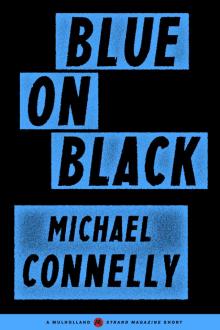 Blue on Black
Blue on Black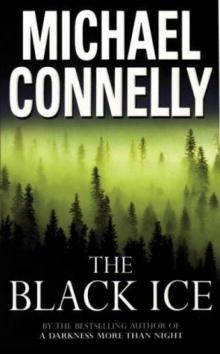 The Black Ice (1993)
The Black Ice (1993) Crime Beat: A Decade of Covering Cops and Killers
Crime Beat: A Decade of Covering Cops and Killers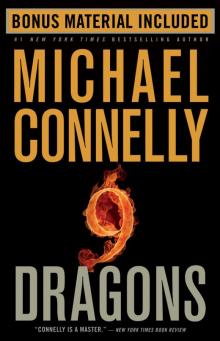 Nine Dragons
Nine Dragons The Late Show
The Late Show City of Bones
City of Bones The Overlook
The Overlook The Crossing
The Crossing The Poet (1995)
The Poet (1995) Murder Worthy
Murder Worthy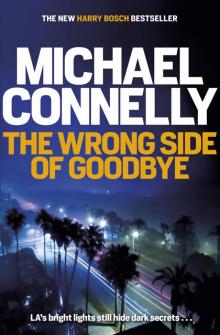 The Wrong Side of Goodbye
The Wrong Side of Goodbye Harry Bosch Novels, The: Volume 2
Harry Bosch Novels, The: Volume 2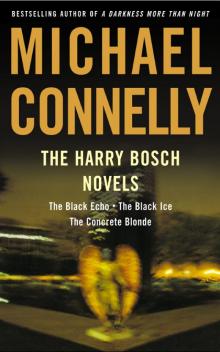 The Harry Bosch Novels
The Harry Bosch Novels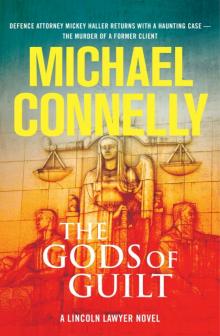 The Gods of Guilt
The Gods of Guilt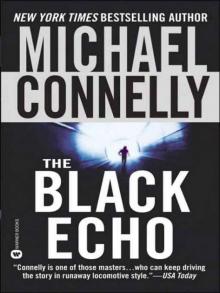 The Black Echo
The Black Echo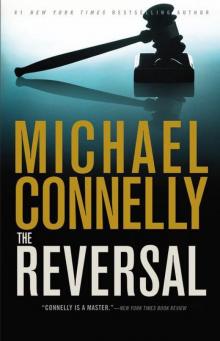 The Reversal
The Reversal Two Kinds of Truth
Two Kinds of Truth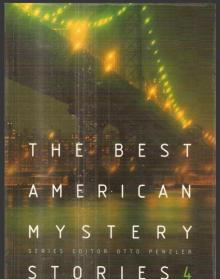 The Best American Mystery Stories 2003
The Best American Mystery Stories 2003 The Rag
The Rag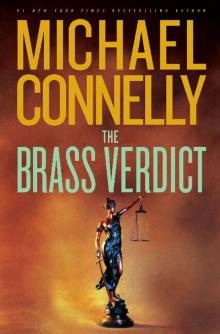 The Brass Verdict
The Brass Verdict The Black Echo (1992)
The Black Echo (1992)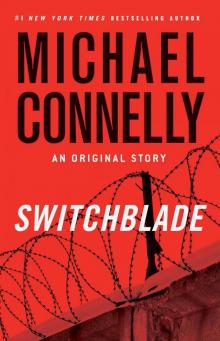 Switchblade
Switchblade The Last Coyote
The Last Coyote The Narrows
The Narrows The Concrete Blonde (1994)
The Concrete Blonde (1994)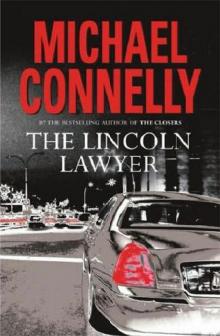 THE LINCOLN LAWYER (2005)
THE LINCOLN LAWYER (2005)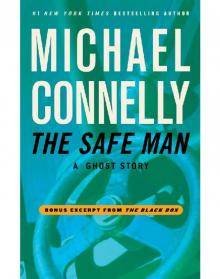 The Safe Man: A Ghost Story
The Safe Man: A Ghost Story Angels Flight (1998)
Angels Flight (1998) Void Moon
Void Moon The Drop
The Drop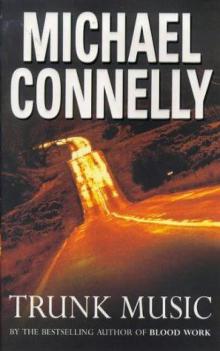 Trunk Music
Trunk Music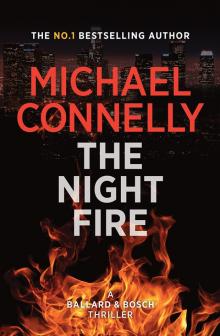 The Night Fire
The Night Fire The Black Ice
The Black Ice Chased Down
Chased Down The Closers
The Closers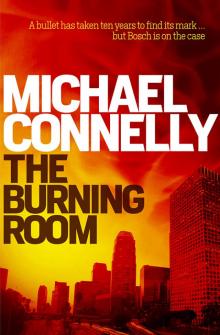 The Burning Room
The Burning Room Angels Flight
Angels Flight SSC (2012) Mulholland Drive
SSC (2012) Mulholland Drive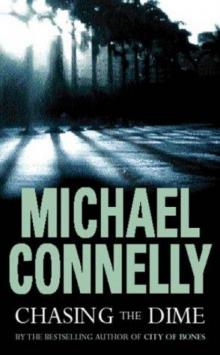 Chasing the Dime
Chasing the Dime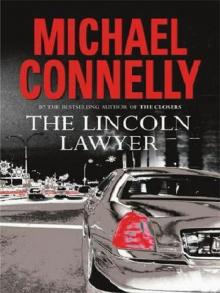 The Lincoln Lawyer
The Lincoln Lawyer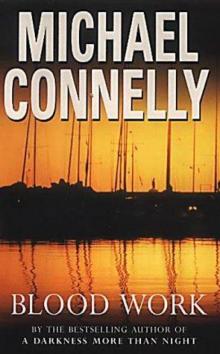 Blood Work (1998)
Blood Work (1998) Echo Park
Echo Park A Darkness More Than Night
A Darkness More Than Night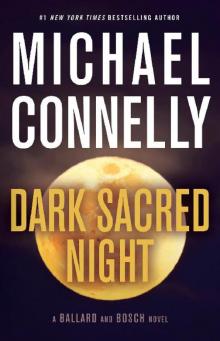 Dark Sacred Night - Ballard and Bosch #1;Renée Ballard #2
Dark Sacred Night - Ballard and Bosch #1;Renée Ballard #2 Lost Light
Lost Light The Scarecrow
The Scarecrow The Concrete Blonde
The Concrete Blonde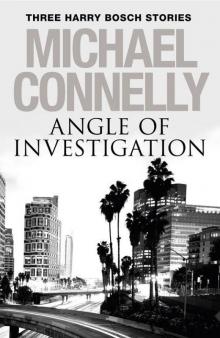 Angle of Investigation
Angle of Investigation Suicide Run: Three Harry Bosch Stories
Suicide Run: Three Harry Bosch Stories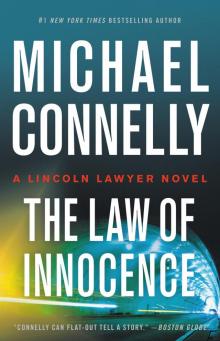 The Law of Innocence
The Law of Innocence Murder in Vegas: New Crime Tales of Gambling and Desperation
Murder in Vegas: New Crime Tales of Gambling and Desperation City Of Bones (2002)
City Of Bones (2002)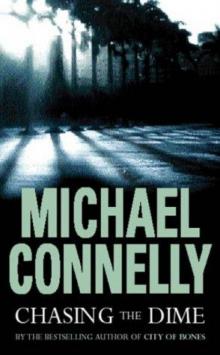 Chasing the Dime (2002)
Chasing the Dime (2002)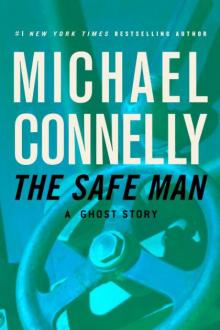 The Safe Man
The Safe Man Two Kinds of Truth (A Harry Bosch Novel)
Two Kinds of Truth (A Harry Bosch Novel)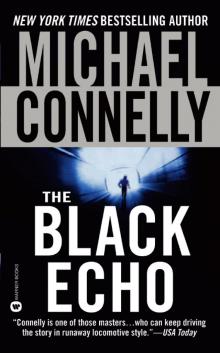 Harry Bosch 01 - The Black Echo
Harry Bosch 01 - The Black Echo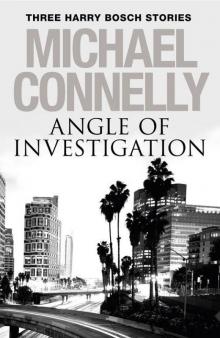 Angle of Investigation: Three Harry Bosch Short Stories
Angle of Investigation: Three Harry Bosch Short Stories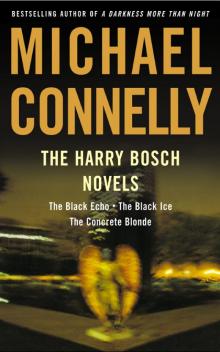 The Harry Bosch Novels Box Set 1
The Harry Bosch Novels Box Set 1 The Concrete Blonde hb-3
The Concrete Blonde hb-3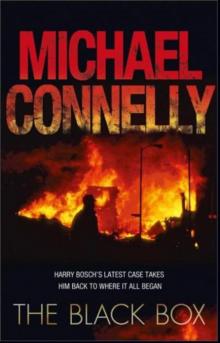 The Black Box hb-18
The Black Box hb-18 Short Stories
Short Stories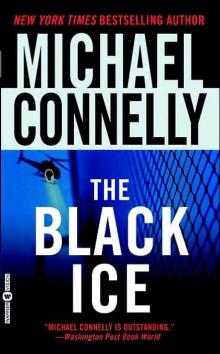 The Black Ice hb-2
The Black Ice hb-2 The Last Coyote (1995)
The Last Coyote (1995) The Gods of Guilt mh-5
The Gods of Guilt mh-5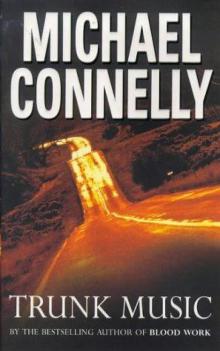 Trunk Music (1996)
Trunk Music (1996) Harry Bosch 02 - The Black Ice
Harry Bosch 02 - The Black Ice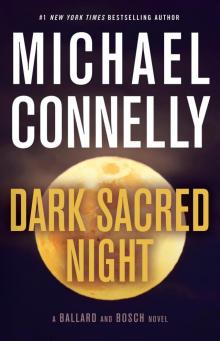 Dark Sacred Night
Dark Sacred Night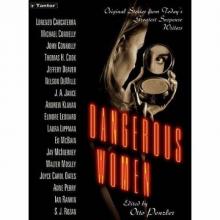 Cielo Azul
Cielo Azul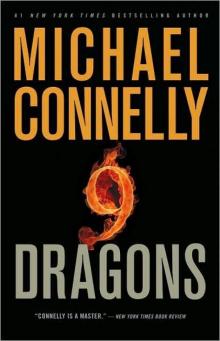 9 Dragons
9 Dragons The Narrows (2004)
The Narrows (2004)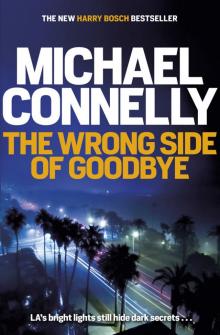 The Wrong Side of Goodbye (Harry Bosch Series)
The Wrong Side of Goodbye (Harry Bosch Series) In The Shadow Of The Master: Classic Tales by Edgar Allan Poe
In The Shadow Of The Master: Classic Tales by Edgar Allan Poe Void Moon (1999)
Void Moon (1999)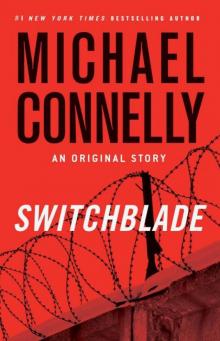 Switchblade: An Original Story (harry bosch)
Switchblade: An Original Story (harry bosch) The Harry Bosch Novels, Volume 2
The Harry Bosch Novels, Volume 2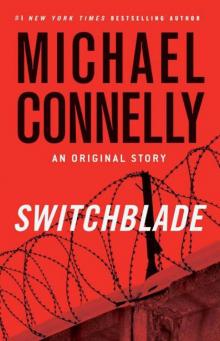 Switchblade: An Original Story
Switchblade: An Original Story The Closers (2005)
The Closers (2005) Crime Beat
Crime Beat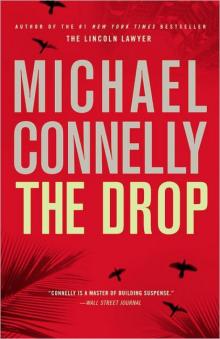 The Drop hb-17
The Drop hb-17 The Gods of Guilt (Mickey Haller 5)
The Gods of Guilt (Mickey Haller 5) Mulholland Dive: Three Stories
Mulholland Dive: Three Stories Lost Light (2003)
Lost Light (2003)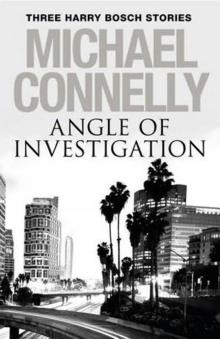 Angle of Investigation: Three Harry Bosch Stories
Angle of Investigation: Three Harry Bosch Stories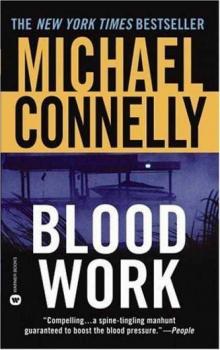 Blood Work
Blood Work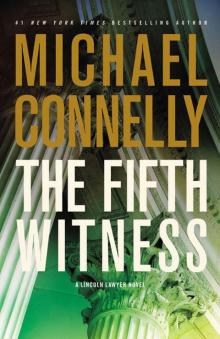 The Fifth Witness: A Novel
The Fifth Witness: A Novel A Darkness More Than Night (2000)
A Darkness More Than Night (2000)